To learn the flute fast, start by setting clear, achievable goals. Break these into smaller milestones and celebrate your progress. Develop a consistent practice routine, focusing on warm-ups and gradually adding new pieces. Prioritize technique by practicing breath control and finger dexterity. Use quality resources like online tutorials and sheet music suited to your level. Don't forget ear training; recognize intervals and improve your musical accuracy. Record your progress to stay motivated and reflect on your growth. By incorporating these strategies, you'll find joy in your flute journey, and there's plenty more to enhance your skills ahead.
Key Takeaways
- Establish clear, specific goals to provide direction and track progress in your flute learning journey.
- Implement a structured daily practice routine focusing on warm-ups, technique, and repertoire for effective skill development.
- Prioritize breath control and finger dexterity through long tones and scales to improve sound quality and confidence.
- Utilize quality resources like online tutorials and sheet music suited to your skill level for focused practice.
- Keep practice engaging by incorporating games, exploring new styles, and connecting with fellow musicians for support.
Set Clear Goals
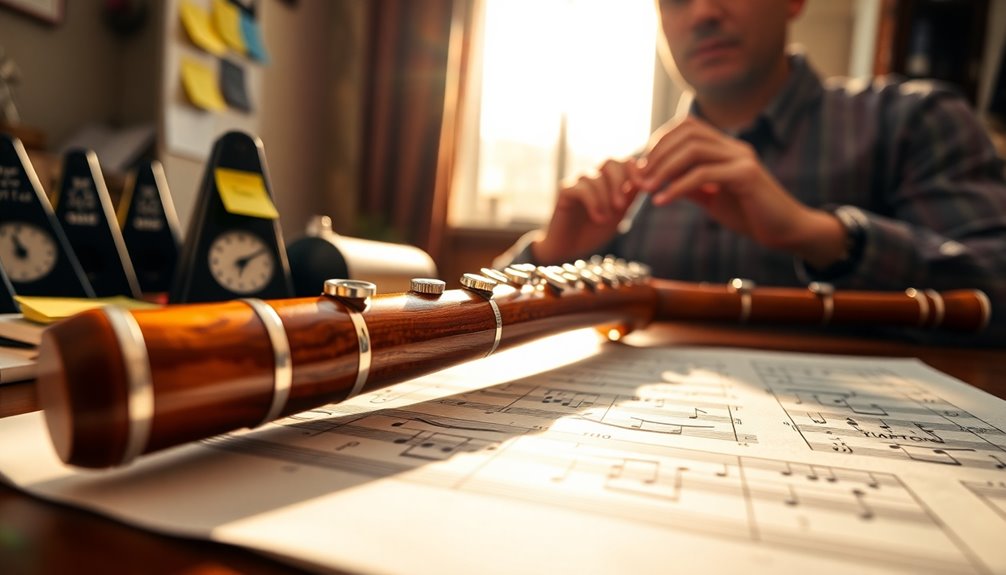
How can you make the most of your flute practice? It starts with setting clear goals. Without specific objectives, your practice can feel aimless, and you might struggle to see progress. Think about what you truly want to achieve. Do you want to master a particular piece, improve your technique, or prepare for an upcoming performance? Defining these goals will give your practice direction and purpose.
Next, break down your overall goals into smaller, manageable performance milestones. These milestones serve as stepping stones, allowing you to track your progress and celebrate achievements along the way. For instance, if your goal is to perform at a local event, set milestones such as mastering a section of your piece, improving your tone, or increasing your speed. These smaller targets will keep you motivated and focused, making your practice sessions more productive.
It's also essential to revisit your goals regularly. As you progress, you might find that your priorities shift or that you need to adjust your expectations. This flexibility is key to staying engaged and committed to your flute practice. Additionally, consider investing in a standard silver-plated flute, as it is widely regarded as suitable for beginners and can enhance your learning experience.
Develop a Routine
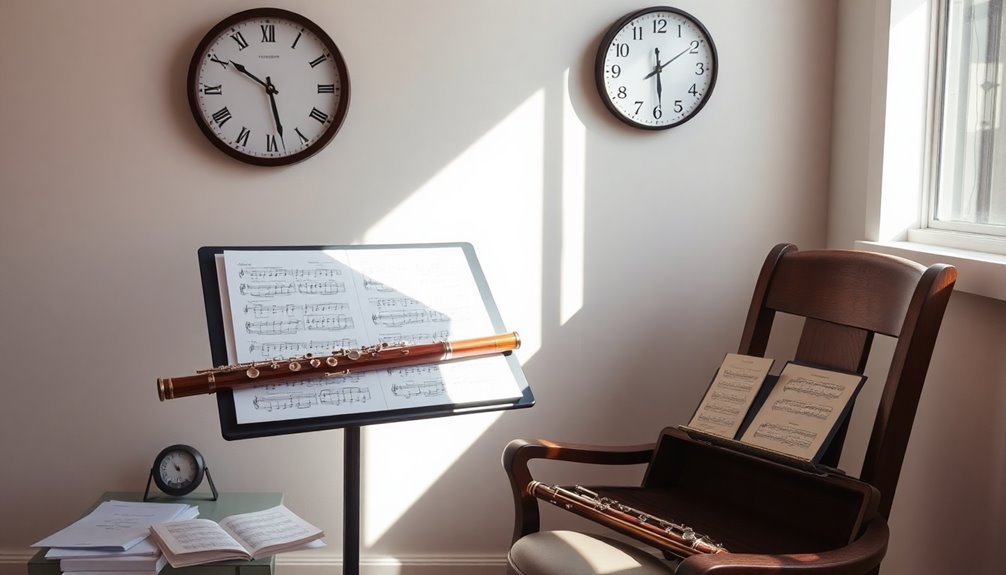
A consistent practice routine is essential for making steady progress on the flute. Establishing a daily schedule not only helps you stay organized but also fosters a sense of belonging within your musical journey. By dedicating specific times for practice, you create a commitment to your growth as a flutist.
Start your routine with flute warm ups to get your fingers and breath ready for playing. These can include long tones, scales, and arpeggios. Here's a simple practice schedule you might consider:
| Time | Activity |
|---|---|
| 5 minutes | Flute warm ups |
| 10 minutes | Scales practice |
| 15 minutes | Song repertoire |
| 10 minutes | Cool down exercises |
Aim to practice at the same time each day to develop a habit. Whether it's early in the morning or after dinner, find what works for you and stick to it. Remember, quality matters more than quantity. Short, focused sessions can be more effective than marathon practices. Incorporating consistent practice schedules fosters skill retention and enhances overall progress.
Stay connected with your flute community, share your progress, and seek support when needed. Developing a routine not only enhances your skills but also builds a sense of camaraderie with fellow flutists. Stick to your practice schedule, embrace the journey, and watch your confidence soar as you grow in your flute playing!
Focus on Technique
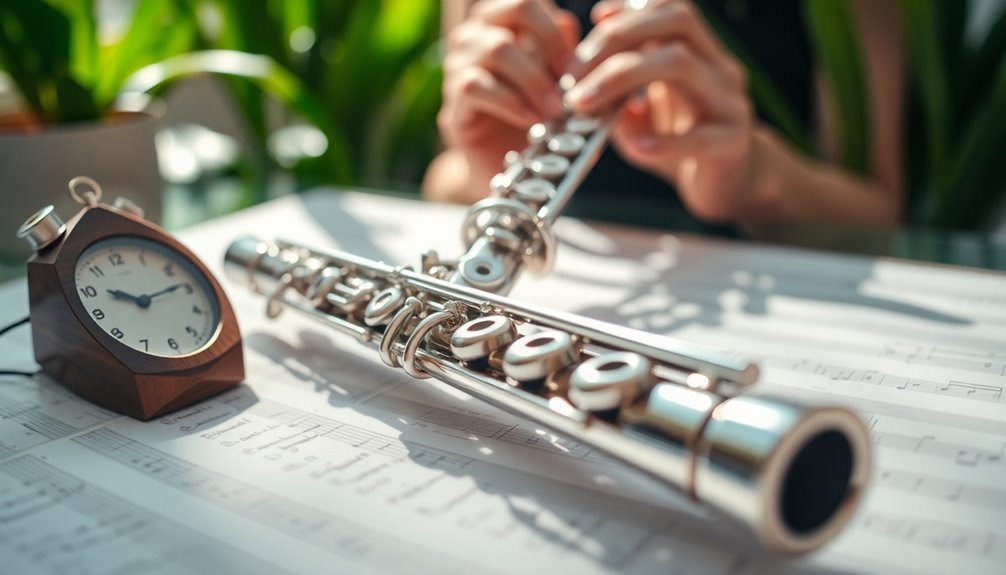
To excel on the flute, honing your technique is essential. You'll want to focus on two key areas: breath control and finger dexterity. Mastering these fundamentals won't only improve your sound but also boost your confidence.
Start with breath control. Good breath support helps you produce a richer tone and sustain notes longer. Practice taking deep, diaphragmatic breaths. Inhale deeply through your nose, allowing your belly to expand, and exhale steadily.
Incorporate long tones into your practice routine. Select a note, play it as softly as possible, and gradually increase your volume while maintaining a steady airflow. This exercise will help you gain control over your breath, making your playing more expressive. Additionally, consider practicing breath control exercises to effectively manage duration and intensity in your musical phrases.
Next, turn your attention to finger dexterity. Quick and accurate finger movements are vital for playing scales and intricate passages. Begin with simple finger exercises, like chromatic scales or arpeggios. Focus on evenness and clarity.
Use a metronome to gradually increase your speed, ensuring you maintain precision. As you grow more comfortable, challenge yourself with more complex pieces that require agility.
Use Quality Resources
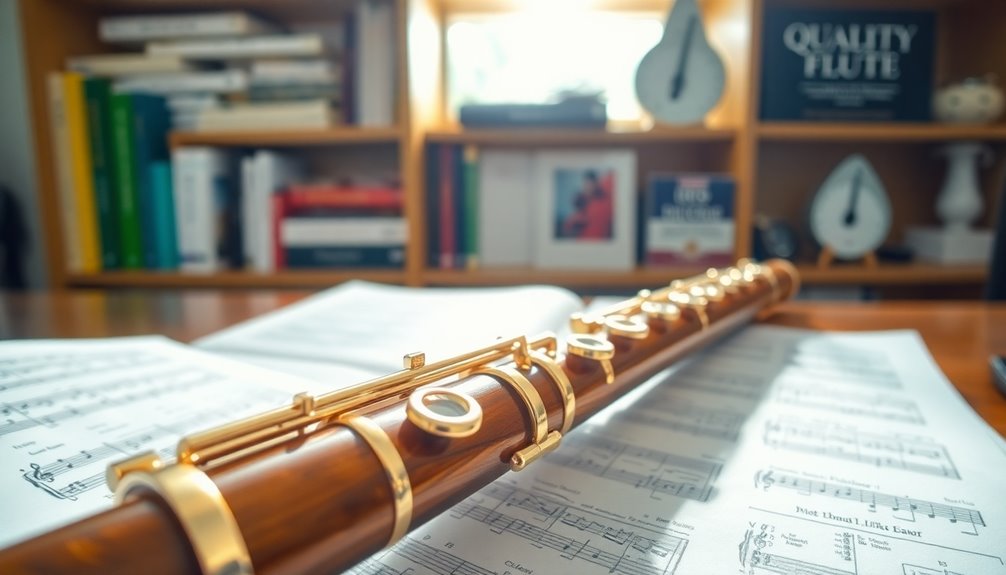
Developing your technique is just the beginning of your flute journey. To truly excel, you need to use quality resources that will enhance your learning experience. Start by selecting sheet music that's appropriate for your skill level. Look for pieces that challenge you but remain enjoyable. This balance will keep you motivated and foster a sense of achievement as you progress.
Don't underestimate the power of online tutorials. There are countless platforms offering video lessons that can help you grasp new concepts and techniques quickly. These tutorials often break down complex pieces into manageable sections, making it easier for you to learn at your own pace.
Plus, seeing a professional flutist demonstrate can provide valuable insights into tone production and phrasing. Many tutorials also include interactive features that allow you to track your progress and assess your improvement over time.
Consider joining online forums or social media groups dedicated to flute players. Engaging with fellow musicians can give you access to recommended resources and tips that you mightn't find on your own. Sharing your experiences and challenges creates a sense of community, reminding you that you're not alone on this journey.
As you gather these resources, remember to stay organized. Create a practice schedule that incorporates your sheet music and online lessons. This structure will help you stay focused and motivated, ensuring you make the most of every practice session.
With the right materials and a supportive community, you'll find that your flute journey isn't just about mastering the instrument but also about belonging to a vibrant community of musicians.
Incorporate Ear Training
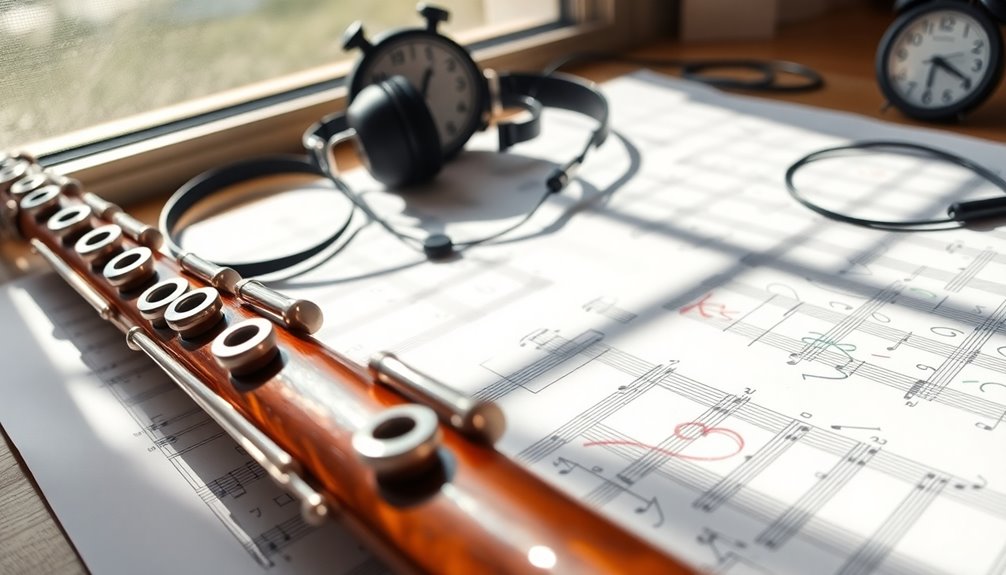
While mastering the flute is essential, incorporating ear training into your practice routine can greatly enhance your musical abilities. By developing your ear recognition skills, you'll not only play more accurately but also connect with music on a deeper level. This connection is important for any musician, and it's something you can cultivate with focused practice.
Start with interval training, which is critical for identifying the distance between notes. Use apps or online resources that offer exercises in recognizing intervals. Spend a few minutes each day listening to two notes played together and try to identify the interval. This exercise will sharpen your ear and make it easier to play by ear, which is a valuable skill when jamming with friends or playing in ensemble settings.
Another effective method is to sing along with the melodies you're practicing. This doesn't just reinforce your ear training; it also helps you internalize the music. You'll find that singing the notes before playing them can drastically improve your accuracy. Additionally, focusing on articulation techniques can enhance your ability to convey musical nuances while playing.
Finally, listen actively to recordings of flute music. Pay attention to the nuances of phrasing and dynamics. Try to replicate what you hear on your flute. This practice will enhance your musical sensitivity and strengthen your overall performance.
Record Your Progress
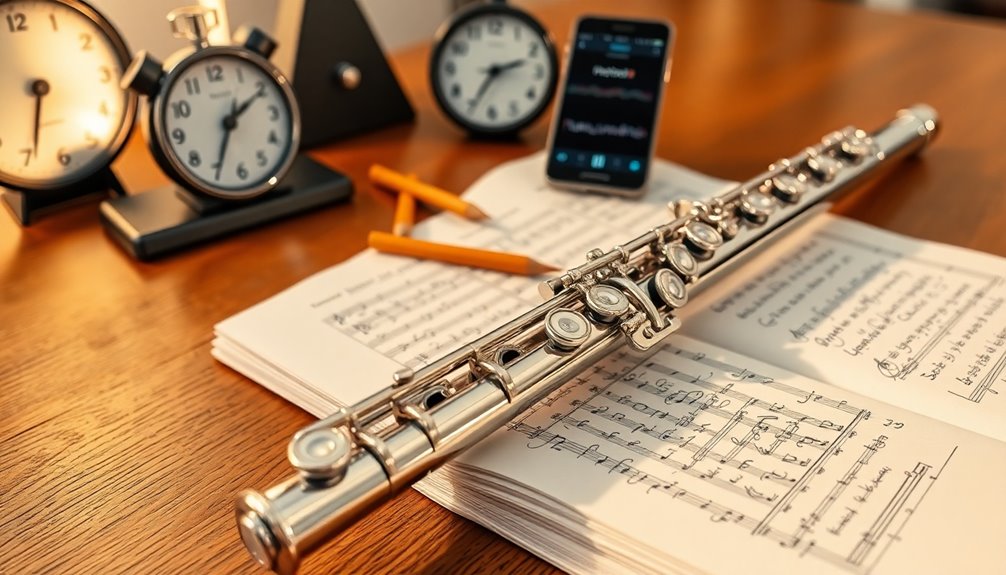
Recording your progress can be a game-changer in your flute practice. By capturing your playing through audio or video, you create tangible evidence of your journey. This not only allows you to track improvement but also helps you celebrate your milestones. Each recording serves as a snapshot of your skills at that moment, making it easier to see how far you've come.
As you analyze recordings, you'll notice nuances in your tone, technique, and timing that might be hard to catch in real-time. This self-awareness can lead to more focused practice sessions. Here's a simple table to help you understand what to look for when you listen back to your recordings:
| Aspect to Analyze | Example Improvement Focus |
|---|---|
| Tone Quality | Work on breath control |
| Rhythm Consistency | Practice with a metronome |
| Dynamics | Experiment with volume |
| Articulation | Clarify note connections |
| Phrasing | Shape musical sentences |
When you reflect on your recordings, you'll not only track improvement but also connect deeper with your music. Sharing these recordings with fellow flutists can foster a sense of belonging and community. It's encouraging to witness your growth alongside others who share your passion. So grab your recording device, and start documenting your journey; you'll be amazed at how motivating it can be! Additionally, incorporating a metronome practice routine can significantly enhance your timing and rhythm accuracy.
Stay Motivated

Staying motivated in your flute practice can sometimes feel challenging, but there are effective strategies to keep your enthusiasm alive. First, set achievable goals for yourself. Break down larger pieces into smaller sections, and celebrate each milestone. This creates a sense of accomplishment and keeps you focused on your progress.
Next, find inspiration in various ways. Listen to recordings of your favorite flutists or attend live performances. Watching others excel can reignite your passion and remind you of why you started playing in the first place. Additionally, consider experimenting with different genres of music. Exploring new styles can make practice feel fresh and exciting.
Joining a community can also be a game changer. Whether it's an online forum or a local flute choir, connecting with fellow musicians allows you to share experiences, tips, and encouragement. You'll find that you're not alone in your journey, which can be incredibly motivating.
Participating in group practices or workshops can foster a sense of belonging and provide accountability. Remember that the flute's versatility across genres is an excellent opportunity to explore music you love and keep your practice engaging.
Lastly, remember to keep it fun! Incorporate games or challenges into your practice sessions to keep things light-hearted. By mixing enjoyment with dedication, you'll maintain a healthy balance that sustains your motivation.
Embrace these strategies, and you'll find your flute practice not only becomes more enjoyable but also more rewarding. Keep playing, stay inspired, and let your love for music shine through!
Frequently Asked Questions
How Long Does It Take to Learn the Flute?
The time it takes to learn the flute varies, but you can expect a learning curve of several months with regular practice.
If you dedicate around 30 minutes a day, you'll notice significant progress in just a few weeks.
Your practice duration matters, so stay consistent and patient.
Celebrate small achievements along the way, and remember, every flutist started where you're now.
You're part of a wonderful community, and growth is just around the corner!
Can I Learn Flute Without a Teacher?
Absolutely, you can learn the flute without a teacher! Many people successfully use self-taught methods to master their instrument.
Start by exploring online resources like video tutorials and sheet music websites. These tools provide valuable guidance and support as you progress.
Make a practice schedule, stay disciplined, and connect with online communities for motivation.
What Is the Best Flute for Beginners?
When you're starting your musical journey, picking the right instrument can feel like an intimidating task.
For beginners, beginner flutes from reputable flute brands like Yamaha or Gemeinhardt are fantastic choices. These flutes offer great sound quality and are designed for ease of play.
They'll help you feel confident as you explore your new passion. Investing in a good beginner flute sets you up for success and encourages your musical growth.
How Often Should I Practice the Flute?
To improve your flute skills, aim for consistent practice frequency.
Ideally, you should practice at least 30 minutes daily, but even shorter sessions can be effective if done regularly.
Establish effective routines that include warm-ups, technique exercises, and playing pieces you enjoy.
Remember, it's not just about the time spent, but the quality of your practice.
Stay committed, and you'll see progress while feeling a sense of belonging in your musical journey.
What Are Common Mistakes to Avoid When Learning Flute?
When learning the flute, it's essential to avoid common mistakes that can hinder your progress.
Make sure you're practicing proper breath control; poor breathing can limit your sound quality.
Additionally, pay attention to your finger placement; incorrect positioning can lead to awkward playing and frustration.
Remember, everyone makes mistakes, so don't get discouraged.
Focus on these aspects, and you'll find yourself improving and enjoying your flute journey much more!
Conclusion
By following these proven practice tips, you'll find yourself soaring like a bird in flight, mastering the flute with ease. Set clear goals, develop a routine, and focus on your technique to build a strong foundation. Use quality resources and incorporate ear training to enhance your skills. Don't forget to record your progress and stay motivated along the way. Embrace the journey, and soon you'll be playing beautiful melodies that resonate with your heart and soul.






